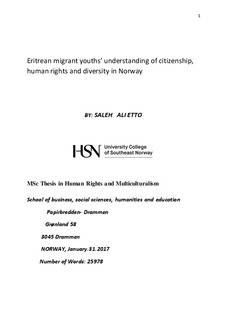| dc.description.abstract | The goal of this thesis is to investigate Eritrean youth participants’ perceptions, experiences, attitudes and feelings about citizenship, diversity, integration and human rights education that they are learning in schools and integration programs that they attend after they have settled in Norway. The thesis examines whether the informants experience multicultural classrooms that reflect and affirm their identities, and whether the institutions are inclusive and genuinely participatory. The thesis examines how these students are prepared for their citizenship roles and how do they experience the values and virtues of democracy, diversity and tolerance in their daily life. Qualitative semi- structured interviews were conducted with eight Eritrean students who are studying in two upper secondary high schools in the Oppland region of Norway from January 2016 to February 2016.
The thesis tries to examine the challenges and opportunities these informants get in Norway and the impact of that experience in their approaches, feelings and thinking toward the questions of identity, citizenship and belonging. Education has a vital role in preparing students for their future roles as citizens, but formal education alone is insufficient as students are influenced by what they see, hear and experience outside the school. The thesis findings show that all my respondents wish to be Norwegian citizens, but most of them express fear, uncertainty and anxieties about citizenship expectations as they feel that they may not be accepted as full citizens because of their appearance, religion and backgrounds. There are many reports that immigrants are often mentioned with problems like crimes and they are linked with negative behaviors in media debates. There are concerns about increasing xenophobia, islamophobia, raising support for right wing political parties, hateful speeches and racist comments toward minorities. The findings indicate that such a situation creates worries, fear, suspicion and feeling of alienation among participants’. This thesis argues that we need to re-imagine our concept of citizenship, national values and national identity. | nb_NO |
